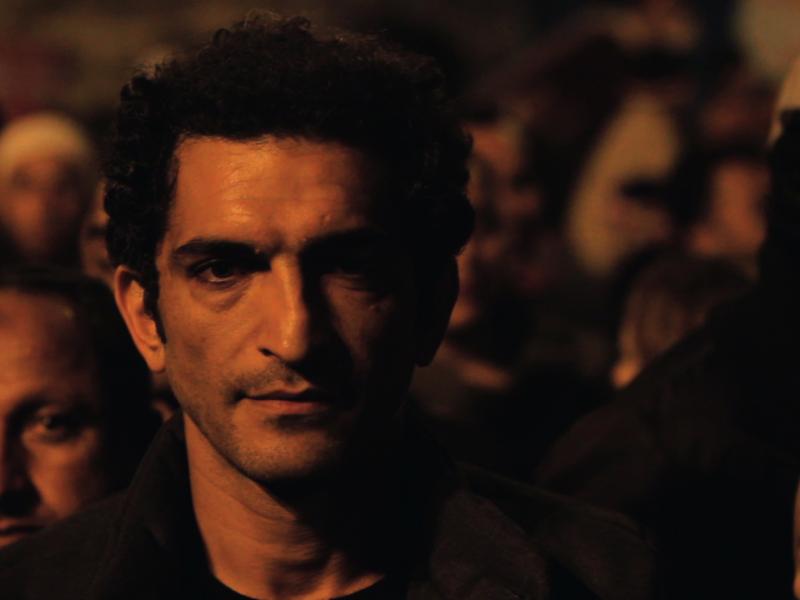Along with highlights from the 67th International Berlin Film Festival’s packed program, the seven jury members who will be picking the winning films this year have been revealed.The bear is exhausted – or at least that’s the impression the mascot of Berlin’s international film festival gives on this year’s Berlinale poster, as a huge brown bear is pictured leaning against a column of one of the city’s U-Bahn stations.
However, with less than 10 days to go before Germany’s largest film festival kicks off, exhaustion isn’t an option for the Berlinale’s director, Dieter Kosslick.
Kosslick: ‘Focus on Europe’
From February 9-19, festival-goers from all over the world will fill up Berlin’s numerous movie theaters. Europe will be a focus of the festival this year, according to the Berlinale’s director.
“It will deal with the history of Europe and its wars,” Kosslick told German news agency dpa. “It’s also about the loss of two great utopias, those of the formerly politically divided East and West of Europe. People no longer trust capitalism – and they stopped believing in communism a long time ago, too.”
One thing is certain: There is bound to be many discussions surrounding US President Donald Trump and his policies during the festival. The Berlinale has long been considered the most political of the world’s major film festivals; current political issues are often raised during the films’ Q&A sessions.
A highlight among the political-historical works is “The Young Karl Marx,” which will premiere at the Berlin film festival.
Competing for the Bears
Twenty-four films will screen as part of the competition in the Berlinale Palast, with just as many red carpet events on Potsdamer Platz. Some of the works on the list are screening out of competition, while 18 of them are running for the Golden and Silver Bear awards.
Opening the 67th Berlin International Film Festival is the biopic “Django,” about jazz legend Django Reinhardt.
German cinema is well represented in this year’s competition. Oscar-winning director Volker Schlöndorff is presenting his adaptation of a Max Frisch story, “Return to Montauk.” Thomas Arslan is releasing his new film, “Bright Nights,” and Anders Veiel is also in the run with his documentary, a biography of the famous German artist, “Beuys.”
Five other German co-productions will be vying for the vote of the jury, led by Dutch director Paul Verhoeven.
Aki Kaurismäki and Josef Hader
Prominent filmmakers such as Aki Kaurismäki (Finland), Danny Boyle (UK) and Agnieszka Holland (Poland) are among the highlights of the competition. The directorial debut of Austrian actor Josef Hader is also highly awaited. The US is in the contest as well, with James Mangold and Oren Moverman. Films from Asia, Latin America and several European countries are also on the list.
Experimental films
The 47th Forum, a section of the festival that focuses on political cinema while featuring experimental and unconventional forms, boasts a rich program in 2017. Of its 43 films, many are from Latin and North America.
Cinematic classic gems from Morocco and South Korea promise insight into lesser-known film cultures.
The three-hour film, “ORG,” by Argentinean filmmaker Fernando Birri, now aged 91, is highly awaited. Loosely based on a story by Thomas Mann, it is an experimental collage of 26,000 clips that has rarely been screened since its release in 1978.
The Berlinale: world cinema hub
The Panorama section, which features modern art-house cinema as well as films that will be released in theaters throughout the year, includes 51 works in its program. Here, too, feature films and documentaries from all over the world are combined. It offers the opportunity, for example, to discover a New Zealand film by a Samoan director.
Under the theme “Future Imperfect. Science. Fiction. Film,” the Retrospective section is set to explore both the past and the future. “To select the films for the retrospective, we were inspired by our exhibition ‘Things to Come,'” says Rainer Rother, director of the section and of the Deutsche Kinemathek. “The retrospective explores the history of the genre through different countries such as Denmark, Japan, Poland or former Czechoslovakia.”
Fans of film history can also look forward to the program in the Classics section. It will feature among others “Avanti Popolo” by Israeli filmmaker Rafi Bukaee, a tragicomedy about the absurdity of war, directed in 1986.
Movie-goers will be spoiled for choice once again this year: The entire program includes screenings of some 400 films. Along with the sections Competition, Forum, Panorama and Retrospective, the Generation program offers films for a younger audience. Culinary Kino is a section devoted to film and food and the section NATIVe features works by aborigines.
With all the premieres, several stars will walk the red carpet, among which Catherine Deneuve, Richard Gere, Geoffrey Rush and Ethan Hawke.
Berlin’s film market
Producers, distributors and film buyers will be meeting at the European film market (EFM), where over 9,000 participants, production companies and investors are already registered.
Selected young filmmaking talents will once again be meeting in Berlin during the Talent Campus.
If that’s still not enough, there’s also the latest trend that’s been taking over film festivals: TV series screenings. New formats will be shown during the Berlinale, and the Drama Series Days are planned for February 13-15.
With such a packed program, by the end of the festival on February 19, the expected 400,000 movie-goers will probably look just as tired as the Berlinale’s bear.



